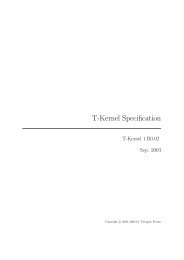[8] 2002 e-business-strategies-for-virtual-organizations
[8] 2002 e-business-strategies-for-virtual-organizations
[8] 2002 e-business-strategies-for-virtual-organizations
Create successful ePaper yourself
Turn your PDF publications into a flip-book with our unique Google optimized e-Paper software.
Developing knowledge-based <strong>strategies</strong> <strong>for</strong> a <strong>virtual</strong> organization<br />
knowledge is amazing but also inevitably confusing. Here we<br />
try to give a more user-friendly view.<br />
Broadly, the term knowledge management is used to describe<br />
the entire <strong>business</strong> of recognizing and managing all of an<br />
organization’s intellectual assets to meet <strong>business</strong> objectives.<br />
These intellectual assets may be in<strong>for</strong>mation passing through<br />
channels, skills and tricks picked up and shared between<br />
employees, or the structured dissemination of regulations,<br />
procedures and the like.<br />
Knowledge management looks at how an organization adapts to<br />
changing conditions to survive in the same way that animal and<br />
plant species change over time to adapt to changing conditions<br />
– or, like unsuccessful firms, they die off or are swallowed up by<br />
more successful competitors. With advances in technology,<br />
communications, transport and shared worldwide media, the<br />
<strong>business</strong> environment is increasingly sensitive to things happening<br />
far away. The speed at which events change the <strong>business</strong><br />
environment is also far faster than ever be<strong>for</strong>e. This means that<br />
<strong>business</strong> success and survival is increasingly a chancy <strong>business</strong><br />
with more opportunities <strong>for</strong> failure at every step.<br />
Essentially, the idea of knowledge management is that it actively<br />
tries to find and create organizational processes that capture and<br />
create useful combinations of:<br />
� data;<br />
� in<strong>for</strong>mation processing;<br />
� all in<strong>for</strong>mation and communications technologies; and<br />
� the creative and innovative capacity of human beings.<br />
Knowledge does not just happen along as a result of processes<br />
or activities; it comes from people and communities of people.<br />
An organization needs to know what knowledge it has and<br />
what knowledge it requires. Here it is important to recognize<br />
that not all knowledge is ready to use and even to be recognized.<br />
While much in<strong>for</strong>mation can be gathered and collected <strong>for</strong><br />
analysis, it is a much harder task to capture the skills and<br />
experience that lie in a person’s mind. Most of us learn by doing<br />
things, and often know when something is a mistake – because<br />
we have seen it be<strong>for</strong>e. It is not always easy to recognize where<br />
this knowledge lies in an organization, and the loss of<br />
knowledge when employees change jobs can be a significant<br />
factor in a firm’s per<strong>for</strong>mance.<br />
David Skyrme and Associates (http://www.syyrme-<br />
.com.km.html) have developed a specific definition of knowledge<br />
management as: ‘Knowledge Management is the explicit<br />
145


![[8] 2002 e-business-strategies-for-virtual-organizations](https://img.yumpu.com/8167654/164/500x640/8-2002-e-business-strategies-for-virtual-organizations.jpg)












